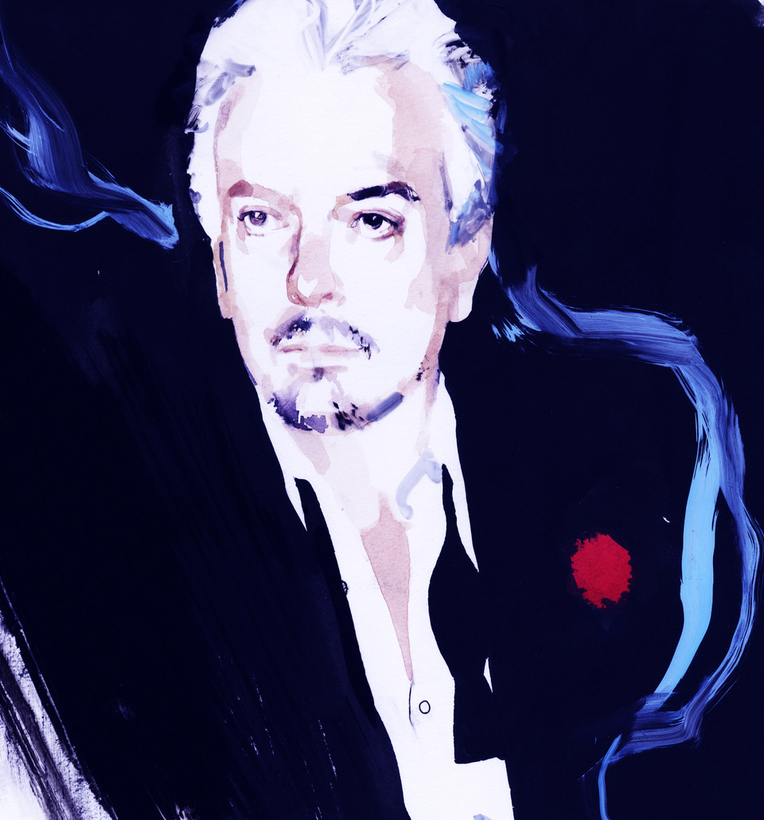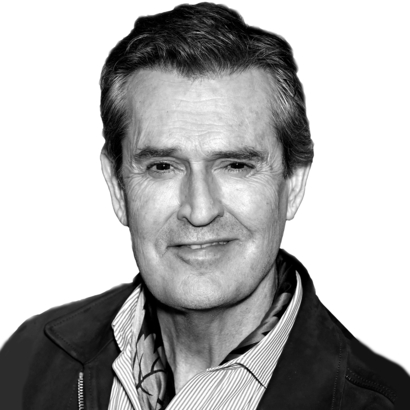Nicky Haslam introduced me to everyone I know. I met Andy Warhol and Bianca Jagger at his party for the opening of the Casserole restaurant, in 1978. I wasn’t invited, incidentally.
At the Hunting Lodge, his 16th-century home, in Hampshire—invited this time—I met Diana Cooper and June Churchill, wife of Randolph, son of Winston, who had “a terrible scuffle when it came to the moment scheduled for her assisted suicide.”
“What happened?,” I asked.
“Don’t you remember? Typical June. When she knew she had no hope, she signed up for Exit, that euthanasia club started by Richard what’s his name, that terrible crook who had been a member of the Mayfair Gang. Victor Bristol and he were the last men to be publicly flogged. In the 30s. Don’t you remember?”

“Not really. I wasn’t actually around then. But wasn’t he called Richard Dawkins or something?”
“I’ll think of it later. Richard Grayson! Phew. Anyway, when they found her the flat was in a terrible mess. Furniture knocked over. Missing carpets. I expect she got cold feet and said, ‘Shall we have another glass of champagne first?’—like she always did—and he ran out of patience.”
“What a horrible picture. Him chasing her around with the plastic bag.”
“In a caftan.”
“Him?”
“No, her, silly.”
For stories like these there are only two or three people left in the world. Nicky can shine a light on the petit points of the remotest footnotes of history. He is my Pepys/peeps.

He is 80 now and remains cheerfully unflustered by all obstacles. For example: “I adored chemotherapy. I found it very calming. And don’t talk to me about radiation. Sheer heaven” is all he will say about a recent spat with the Big C. All these wonderful amused bouches are what have made him so treasured by all and sundry. He is one of our most revered interior decorators, writers, singers, but what he does best is a bit of oral. One can listen entranced for hours at the web he weaves around one dropped name. It’s a shame he wasn’t around in biblical times. He would have been able to clear up so many misunderstandings about the Holy Family. “God wasn’t the father. Mary was having a wild affair with the Good Samaritan.” Etc.
We are reminiscing on a rainy afternoon at the Hunting Lodge. Tomorrow he hands it back to the English National Trust after 40 years of “heaven.” It feels rather somber, Chekhovian almost, surrounded by trunks and boxes, rain pattering against the curtainless windows and the ghosts of all the packed-up pictures and mirrors leaving their strange shadows on the walls, but Nicky is resolutely upbeat, always looking forward, and it’s not an act. “I had to think very hard. Do I really want to take this place on for another 20 years? The answer is no. I’m actually upsizing. Downsizing’s so common.”

The Hunting Lodge was the epicenter of a certain carefree international set. One might find Alice Astor in the garden room or Bryan Ferry on the loo. Only years later did I realize how lucky I was to have lunched with John Betjeman, Douglas Cooper, or John Richardson. At the time I didn’t have a clue who they all were.
Nicky presided over frantic weekend parties with a feathercut bouffant but wearing rather conventional clothes. He was pulpeuse in those days. He drank more. We all did, and there could be appalling rows over dinner, but they usually blew over by teatime on Sunday, and anyway it was all part of the fun.
Later, in Blair’s Britain, that long-ago Camelot, Nicky threw caution to the wind and transformed himself into a rock star. He threw out the sensible suits, dyed his hair jet-black, and draped himself in lavatory chains. The effect was stunning. One night he was Liam Gallagher. The next night Sid Vicious. Today he looks like a lawyer from heaven, razor-thin, pristine in a pearl-gray suit and a Brazilian (beard) wax.

He continues to fascinate. Next week he can be seen crooning to ecstatic audiences across the overdeveloped West End. There is no question of slowing down. He is planning a new book, decorating a schloss, and recording another album.
Driving away, I watch him wave good-bye in the rearview mirror. I am reminded of my favorite story. Nicky arrested on the Mexican border in the early 60s. The police van screeches off in a cloud of smoke, his face appearing through the grate in the back, screaming inaudibly at society beauties Romana von Hofmannsthal and Betty di Robilant, abandoned to their fate on a deserted mountain road.
“What? We can’t hear,” scream back the ladies, to no avail.
Only when the police van is on the other side of the valley can Nicky’s voice be heard over the noise of the engine, clear, clipped, like Noël Coward across the expanse of giant cacti in the sunset.
“Call the American ambassador and tell him to call Merle Oberon!”
They did and he was out in half an hour.
Rupert Everett is an actor and writer based in London


